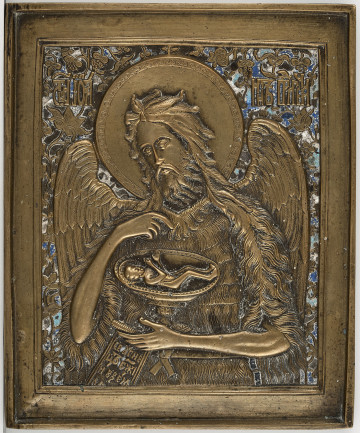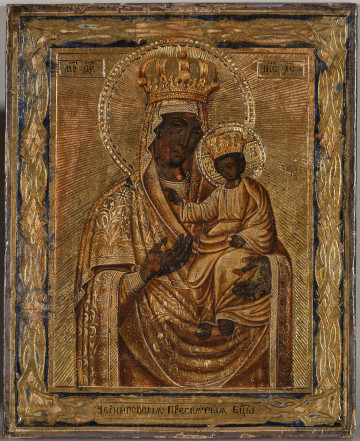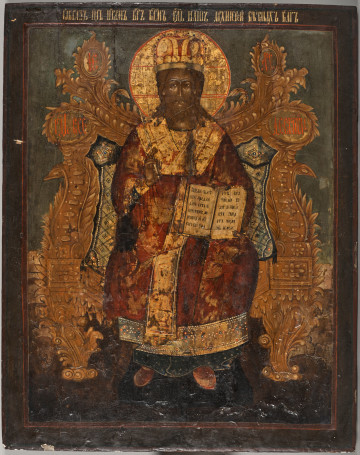
St. John the Baptist
20th century
Castle Museum in Łańcut
Part of the collection: Icons
Council of the Holy Martyrs The Old Believers, who did not recognise the liturgical reform of the Patriarch Nikon, were persecuted by the official Church and the State and had to seek shelter in the farthest hard-to-reach regions. It is not surprising then, that they understood life as a journey, both literally and religiously - as it relates to the search for truth untainted by the influence of the Antichrist. To avoid becoming tainted, they used the objects of worship they created themselves. Adherents of the old tradition attributed special importance to icons. These were, among others, small cast icons which were convenient to use, commonly known as 'tabletky' ('small tablets'), like the one displayed here. On the pictures, there were depictions of selected venerated saints to whom one could pray for various needs. On the displayed icon, there are martyrs from the days of early Christianity: Bishop Charalampus (middle), John the Warrior (left), and Boniface of Tarsus (right). Charalampus, the Bishop of Thessaly, who lived in the 2nd c. and who was persecuted for his faith, was able to convert even his tormentors. Beheaded on the 10th of February 202 (in the Julian calendar), he became the intercessor in matters of misery and sickness, as well as sudden and unexpected death. Boniface was tortured and beheaded in Tarsus around the year 290 or at the start of the 4th c., during the time of the persecution of Christians by the emperor Diocletian. In Eastern tradition, he aids in the fight against alcoholism (his feast day is December 19 in the Julian calendar). In the Western tradition, he is one of the 'Ice Saints' (feast day: May 14 in the Gregorian calendar). John the Warrior was a martyr of Slavic origin, who lived in the 4th c. Serving in the army for Emperor Julian the Apostate (361-363), he was forced to participate in the persecution of Christians, whom he protected by aiding their escapes or warning them about coming attacks. When captured, he avoided execution solely because of the death of the emperor. He is the patron of the imprisoned, the wronged, and the bereaved (feast day: July 30 in the Julian calendar). Teresa Bagińska-Żurawska https://orcid.org/0000-0002-9243-3967
Dimensions
height: 6 cm, width: 5.5 cm
Object type
Icons
Technique
cast
Material
brass
Origin / acquisition method
decyzja administracyjna
Creation time / dating
Creation / finding place
Owner
Castle Museum in Łańcut
Identification number
Location / status

20th century
Castle Museum in Łańcut

19th (?) century
Castle Museum in Łańcut

1800 — 1850
Castle Museum in Łańcut
DISCOVER this TOPIC
Castle Museum in Łańcut
DISCOVER this PATH
Educational path